- Home
- W. Somerset Maugham
Ten Novels and Their Authors Page 9
Ten Novels and Their Authors Read online
Page 9
Henri Beyle was born at Grenoble in 1783, the son of an attorney, a man of property and of some consequence in the city; his mother, the daughter of a distinguished and cultured doctor, died when he was seven. I cannot in these pages give more than a summary account of Stendhal’s life, for it would need a book to describe it adequately, and I should have to go into the social and political history of the time; fortunately such a book has been written, and if the reader of Le Rouge et le Noir is sufficiently interested to want to know more about its author than I propose to tell him, he cannot do better than to read the lively and well-documented biography which Mr. Matthew Josephson has published under the title: Stendhal, or The Pursuit of Happiness.
(2)
Stendhal has described at length his life as child and boy, and it is interesting to study, because during this period he conceived prejudices which he maintained to his life’s end. On the death of his mother, whom he loved, as he says, with a lover’s love, he was left to the care of his father and his mother’s sister. His father was a grave, conscientious man; his aunt strict and devout. He hated them. Though belonging to the middle class, the family had aristocratic leanings, and the Revolution, which broke out in 1789, filled them with dismay. Stendhal claims that his childhood was miserable, but it does not appear from his own account that he had much to complain of. He was clever, argumentative and very much of a handful. When the Terror reached Grenoble, Monsieur Beyle was placed on the list of suspects; he thought he owed this to a rival lawyer, named Amar, who wanted his practice. ‘But Amar,’ said the smart little boy, ‘has put you on the list of those suspected of not loving the republic, and it is certain that you do not love it.’ True, of course; but not very pleasant for a middle-aged gentleman who is in danger of losing his head to hear from the lips of his only son. Stendhal accused his father of a horrid stinginess, but he seems always to have been able to wheedle money out of him when he wanted it. He was forbidden to read certain books, but, as thousands upon thousands of children the world over have done since books were first printed, he read them on the sly. His chief complaint was that he was not permitted to mix freely with other children; but his life cannot have been so solitary as he liked to make out, since he had two sisters, and other little boys shared his lessons with the Jesuit priest who was his tutor. He was, in fact, brought up as children in the well-to-do middle class were brought up at the time. Like all children, he looked upon ordinary restraints as the exercise of outrageous tyranny; and when he was obliged to do lessons, when he was not allowed to do exactly as he chose, regarded himself as treated with monstrous cruelty.
In this he resembled most children, but most children, when they grow up, forget their grievances. Stendhal was unusual in that, at fifty-three, he harboured his old resentments. Because he hated his Jesuit tutor, he became violently anti-clerical, and to the end of his life could hardly bring himself to believe that a religious person might be sincere; and because his father and aunt were devoted royalists, he became ardently republican. But when one evening, being then eleven years old, he slipped out of the house to go to a revolutionary meeting, he had something of a shock. He found the proletariat dirty and smelly, vulgar and ill-spoken. ‘In short, I was then as I am today,’ he wrote, ‘I love the people, I hate their oppressors, but it would be a perpetual torture for me to live with the people … I had, and I have still, the most aristocratic tastes, I would do everything for the happiness of the people, but I would sooner, I believe, pass two weeks every month in prison than live with shopkeepers.’
The boy was clever and a good mathematician, and at sixteen he persuaded his father to let him go to Paris to enter the École Polytechnique to prepare himself for a career in the army. But this was only an excuse to get away from home. When the day came for him to present himself for the entrance examination, he stayed away. His father had given him an introduction to a connection of his, a Monsieur Daru, whose two sons were in the War Office. Pierre, the elder, held an important position, and after some time, at the request of M. Daru, his father, he engaged the youth, who was at a loose end and for whom some occupation had to be found, as one of his many secretaries. Napoleon set out on his second campaign in Italy, the brothers Daru followed him, and a little later Stendhal joined them at Milan. After some months on the clerical staff, Pierre Daru got him a commission in a regiment of dragoons, but, enjoying the gaieties of Milan as he did, he made no attempt to join it and, taking advantage of his patron’s absence, he wheedled a certain General Michaud into making him his A.D.C. When Pierre Daru came back, he ordered Stendhal to join his regiment; but this, on one pretext and another, he avoided doing for six months, and when at last he did, found himself so bored that on a plea of illness he got leave of absence to go to Grenoble, and there resigned his commission. He saw no action, but this did not prevent him from boasting in after years of his prowess as a combatant; and indeed in 1804, when he was looking for a job, he wrote a testimonial himself (which General Michaud signed) in which he certified to his gallantry in various battles in which it has been proved he could not possibly have been engaged.
After spending three months at home, Stendhal went to live in Paris on a small, but sufficient, allowance from his father. He had two objects in view. One was to become the greatest dramatic poet of the age. For this purpose, he studied a manual of playwriting and assiduously frequented the theatre. He seems, however, to have had little power of invention, since over and over again one finds him unscrupulously remarking in his diary how he could take a play he had just seen and work it over into one of his own; and he was certainly no poet. His other object was to become a great lover. For this nature had ill equipped him. He was somewhat undersized, an ugly, plump young man with a big body and short legs, a large head and a mass of black curly hair; his mouth was thin, his nose thick and prominent; but his brown eyes were eager, his feet and hands small, and his skin as delicate as a woman’s. He was proud to declare that to hold a sword raised blisters on his hand. He was, besides, shy and awkward. Through his cousin, Martial Daru, Pierre’s younger brother, he was able to frequent the salons of some of the ladies whose husbands the Revolution had enriched; but he was sadly tongue-tied in company. He could think of clever things to say, but could never summon up the courage to say them. He never knew what to do with his hands, and he bought a cane so that by playing with it he should make some use of them. He was conscious of his provincial accent, and it may be that it was to cure himself of this that he entered a dramatic school. Here he met a small-part actress, Mélanie Guil-bert by name, two or three years older than himself, and, after some hesitation, decided to fall in love with her. He hesitated partly because he was not sure whether she had a greatness of soul equal to his own and partly because he suspected that she was suffering from a venereal disease. Having presumably satisfied himself on both these points, he followed her to Marseilles, where she had an engagement, and where for some months he worked at a wholesale grocer’s. He came to the conclusion that she was not, either spiritually or intellectually, the woman he had thought; and it was a relief to him when, her engagement having come to an end, lack of money obliged her to return to Paris.
Stendhal was highly sex-conscious, but not particularly sexual; indeed, until some very frank letters were discovered from one of his later mistresses, it was commonly suspected that he was impotent. That is what the hero of his first novel, Armance, was. It is not a good novel. André Gide, however, greatly admired it; for a reason, I think, which is not hard to guess: it corroborated his own conviction, derived of course from his peculiar relations with his wife, that it is possible to be deeply in love without sexual desire. But there is all the difference between loving and being in love. It is possible to love without desire, but without desire impossible to be in love. Stendhal was evidently not impotent. He made his condition clear in the chapter of De l’Amour which he entitled “Fiasco”. To put it bluntly, his fear of not coming up to the scratch on occasion made him unable to d
o so, and thus gave rise to the rumours which mortified him. His passions were cerebral, and to possess a woman was chiefly a satisfaction to his vanity. It assured him of his own virility. Notwithstanding his high-flown phrases, there is no sign that he was capable of tenderness. He admits frankly that most of his love affairs were unfortunate, and it is not hard to see why. He was faint-hearted. When in Italy, he asked a brother officer how to go about it to win a woman’s ‘favours’, and solemnly wrote down the advice he received. He laid siege to women by rule, just as he had tried to write plays by rule; and he was affronted when he discovered that they thought him ridiculous, and surprised when they discerned his insincerity. Intelligent as he was, it seems never to have occurred to him that the language a woman understands is the language of the heart, and that the language of reason leaves her cold. He thought he could achieve by stratagem and chicanery what can only be achieved by feeling.
Some months after Mélanie left him, Stendhal once more found himself n Paris. This was in 1806. By this time Pierre, now Count Daru, was more important than ever. Stendhal’s conduct in Italy had caused Pierre to form a poor opinion of his cousin, and it was only on his wife’s persuasion that he was induced to give him another chance. After the battle of Jena his younger brother, Martial, was assigned to serve at Brunswick, and Stendhal accompanied him as deputy commissary of war. He performed his duties so capably that, when Martial Daru was called elsewhere, he succeeded him. Stendhal abandoned the idea of being a great dramatist and decided to make a career for himself in the bureaucracy. He saw himself as a Baron of the Empire, a Knight of the Legion of Honour and, finally, as Prefect of a department with a princely stipend. Ardent republican though he was, and looking upon Napoleon as a tyrant who had robbed France of her liberty, he wrote to his father asking him to buy him a title. He added the particule to his name, and called himself Henri De Beyle. But notwithstanding this foolishness, he was a competent and resourceful administrator; and in an uprising occasioned by a French officer who in a dispute with a German civilian drew his sword and killed him, he behaved with notable courage. In 1810, having gained promotion, he was once more in Paris, with an office in a superb suite in the Palais des Invalides and a handsome salary. He acquired a cabriolet with a pair of horses, a coachman and a man-servant. He took a chorus-girl to live with him. But this did not suffice: he felt that he owed it to himself to have a mistress he could love, and whose position would add to his prestige. He decided that Alexandrine Daru, Pierre’s wife, would fill the bill. She was a handsome woman many years younger than her distinguished husband, and the mother of his four children. There is no sign that Stendhal gave a thought to the kindness and long-suffering tolerance with which Count Daru had treated him, nor that, since he owed his advancement to him and his career depended on his good graces, it was neither politic nor elegant to seduce his wife. Gratitude was a virtue unknown to him.
He set about the enterprise with a crop of amorous devices, but the unfortunate diffidence of which he could not rid himself still hampered him. He was by turns sprightly and sad, flirtatious and cold, ardent and indifferent: nothing served; and he could not tell whether the Countess cared for him or not. It was a mortification to him to suspect that, because of his bashfulness, she laughed at him behind his back. At length, he went to an old friend and, having exposed his dilemma, asked him what tactics to pursue. They discussed the matter. The friend asked pertinent questions, and wrote down Stendhal’s answers. Here, as summarized by Matthew Josephson, are the replies to the question: ‘What are the advantages of seducing Madame de B.?’ (Madame de B. was what they called Countess Daru.) ‘they are as follows: He would be following the inclinations of his character; he would win great social advantages; he would pursue further his study of human passions; he would satisfy honour and pride.’ A footnote to the document was written by Stendhal: ‘The best advice. Attack! Attack! Attack!’ It was good advice, but not easy to follow by one who is cursed with an unsurmountable timidity. Some weeks later, however, Stendhal was asked to stay at Béche-ville, the Darus’ country house, and on the second morning, after a sleepless night, resolved to take the plunge, he put on his best striped trousers. Countess Daru complimented him on them. They walked in the garden, while a friend of hers with her mother and the children followed twenty yards behind. They strolled up and down, and Stendhal, trembling but determined, fixed upon a certain point, which he called B, at a little distance from the point A to which they had come, and swore that if he did not speak out when they reached it he would kill himself. He spoke, he seized her hand and sought to kiss it; he told her that he had loved her for eighteen months, had done his best to conceal it, and even tried not to see her, but could bear his agony no longer. The Countess replied, not unkindly, that she could look upon him as nothing but a friend, and had no intention of being unfaithful to her husband. She called the rest of the party to join them. Stendhal had lost what he called the Battle of Bècheville. It may be surmised that his vanity rather than his heart was hurt.
Two months after this, still smarting from his disappointment, he applied for leave of absence and went to Milan, with which he had been much taken on his first visit to Italy. There, ten years before, he had been attracted by a certain Gina Pietragrua, who was the mistress of a brother officer of his; but he was then an impecunious sub-lieutenant, and she paid little attention to him. On his return to Milan, however, Stendhal immediately sought her out. Her father kept a shop and, when quite young, she had married a government clerk; by this time she was thirty-four, and had a son of sixteen. On seeing her again, Stendhal found her ‘a tall and superb woman. She still had something of the majestic in her eyes, expression, brow and nose. I found her (he adds) cleverer, with more majesty and less of that full grace of voluptuousness.’ She was certainly clever enough on her husband’s small salary to have an apartment in Milan, a house in the country, servants, a box at the Scala and a carriage.
Stendhal was highly conscious of his homeliness and, to overcome it, made a point of dressing with elegance and fashion. He had always been plump, but by now with good living he was grown portly; however, he had money in his pocket and fine clothes to his back. With these advantages, he must have thought that he had more chance of pleasing the majestic lady than when he was a poverty-stricken dragoon, and he decided to amuse himself with her during his short stay in Milan. But she was not so facile as he had expected. In fact, she led him a dance, and it was not till the eve of his departure for Rome that she consented to receive him in her apartment early one morning. One would have thought it an unpropitious hour for love. That day he wrote in his diary: ‘On the 21st September at half-past eleven, I won the victory I had so long desired.’ He also wrote the date on his braces. He had worn the same striped trousers as on the day of his declaration to Countess Daru.
His leave came to an end, and he returned to Paris. Somewhat to his dismay, he found Count Daru, who had witnessed his young cousin’s attention to his wife with disfavour, more than cold; and when Napoleon started on his disastrous expedition to Russia, it was only with difficulty that Stendhal prevailed upon him to transfer him from his comfortable job at the Invalides to active service in the commissariat. He followed in the wake of the army to Moscow, and in the retreat proved himself as ever cool, enterprising and courageous. On one of the worst mornings, he turned up at Daru’s headquarters for orders, carefully shaved and perfectly groomed in his only uniform. At the passage of the Beresina he saved his life, and that of a wounded officer whom he had taken into his carriage, by his presence of mind. He arrived at last at Königsberg, half starved, having lost his manuscripts and everything he possessed but the clothes he stood up in. ‘I saved myself by force of will,’ he wrote, ‘for I saw many around me give up hope and perish.’ A month later he was back in Paris.
(3)
In 1814 the Emperor abdicated, and Stendhal’s official career came to an end. He claims to have refused the important posts that were offered him and exiled
himself rather than serve under the Bourbons; but the facts are not quite like that; he took the oath of allegiance to the King and made attempts to get back into public service. They failed, and he returned to Milan. He still had enough money to live in a pleasant apartment and go to the opera as often as he chose; but he had neither the rank, the prestige nor the cash he had had before. Gina was cool. She told him that her husband had grown jealous on hearing of his arrival, and that her other admirers were suspicious. He could not conceal from himself that she had no further use for him, but her indifference only inflamed his passion, and at length it occurred to him that there was but one way to regain her love. He raised three thousand francs to give her. They went to Venice, accompanied by her mother, her son and a middle-aged banker. To save appearances, she insisted that Stendhal should live in a different hotel, and much to his annoyance the banker joined them when he and Gina dined together. Here is an extract, in his own English, from his diary: ‘She pretends that she makes me a great sacrifice in going to Venice. I was very foolish of giving her three thousand francs which were to pay for this tour.’ And ten days later: ‘I have had her … but she talked of our financial arrangements. There was no illusion possible yesterday morning. Politics kills all voluptuousness in me, apparently by drawing all the nervous fluid to the brain.’
Notwithstanding this contretemps, Stendhall spent June 18, 1815, the day on which Napoleon was defeated at Waterloo, in the majestic Gina’s arms.

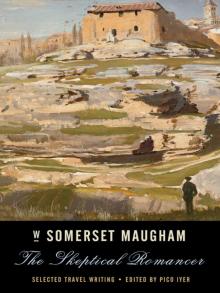 The Skeptical Romancer: Selected Travel Writing
The Skeptical Romancer: Selected Travel Writing The Summing Up
The Summing Up Up at the Villa
Up at the Villa The Razor's Edge
The Razor's Edge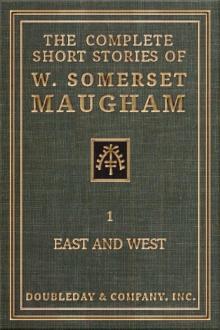 The Complete Short Stories of W. Somerset Maugham: East and West (Vol. 1 of 2))
The Complete Short Stories of W. Somerset Maugham: East and West (Vol. 1 of 2))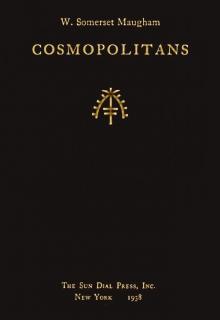 Cosmopolitans
Cosmopolitans 65 Short Stories
65 Short Stories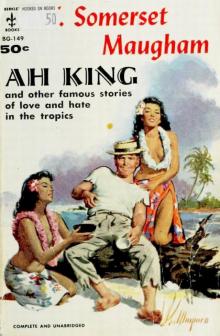 Ah King (Works of W. Somerset Maugham)
Ah King (Works of W. Somerset Maugham) Collected Short Stories: Volume 1
Collected Short Stories: Volume 1 Collected Short Stories Volume 2
Collected Short Stories Volume 2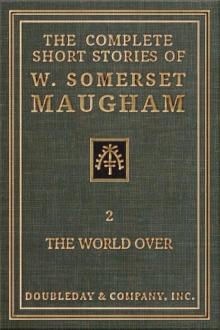 The Complete Short Stories of W. Somerset Maugham - II - The World Over
The Complete Short Stories of W. Somerset Maugham - II - The World Over Collected Short Stories Volume 4
Collected Short Stories Volume 4 Theatre
Theatre Short Stories
Short Stories Then and Now
Then and Now The Favorite Short Stories of W. Somerset Maugham
The Favorite Short Stories of W. Somerset Maugham Of Human Bondage
Of Human Bondage The Magician
The Magician The Great Exotic Novels and Short Stories of Somerset Maugham
The Great Exotic Novels and Short Stories of Somerset Maugham A Writer's Notebook
A Writer's Notebook Christmas Holiday
Christmas Holiday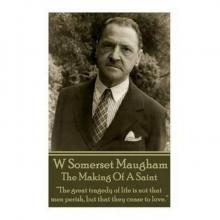 The Making of a Saint
The Making of a Saint Merry Go Round
Merry Go Round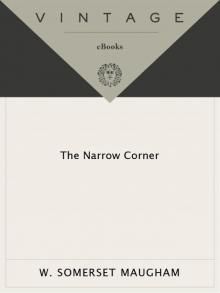 The Narrow Corner
The Narrow Corner Collected Short Stories Volume 3
Collected Short Stories Volume 3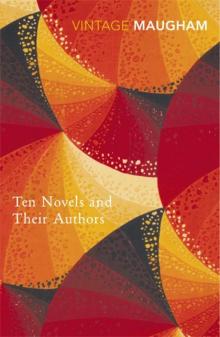 Ten Novels and Their Authors
Ten Novels and Their Authors Ashenden
Ashenden The Moon and Sixpence
The Moon and Sixpence Cakes and Ale
Cakes and Ale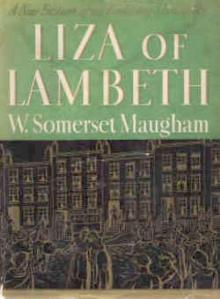 Liza of Lambeth
Liza of Lambeth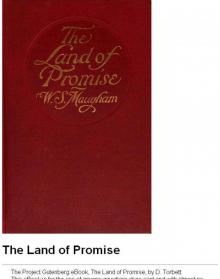 The Land of Promise: A Comedy in Four Acts (1922)
The Land of Promise: A Comedy in Four Acts (1922) A Writer's Notebook (Vintage International)
A Writer's Notebook (Vintage International)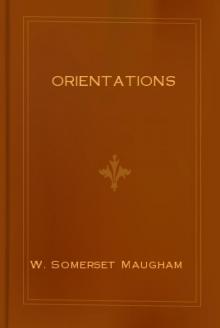 Orientations
Orientations Selected Masterpieces
Selected Masterpieces Mrs Craddock
Mrs Craddock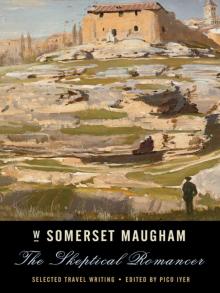 The Skeptical Romancer
The Skeptical Romancer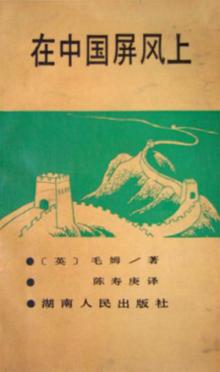 On a Chinese Screen
On a Chinese Screen (1941) Up at the Villa
(1941) Up at the Villa The Great Novels and Short Stories of Somerset Maugham
The Great Novels and Short Stories of Somerset Maugham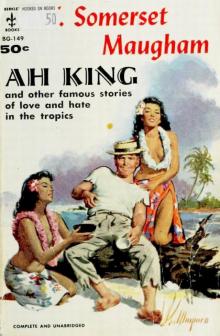 Ah King
Ah King The Explorer
The Explorer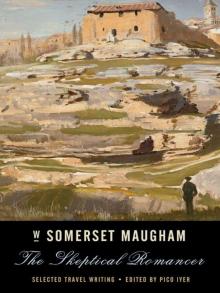 The Skeptical Romancer: Selected Travel Writing (Vintage Departures)
The Skeptical Romancer: Selected Travel Writing (Vintage Departures)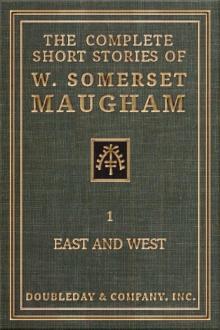 The Complete Short Stories of W. Somerset Maugham - I - East and West
The Complete Short Stories of W. Somerset Maugham - I - East and West